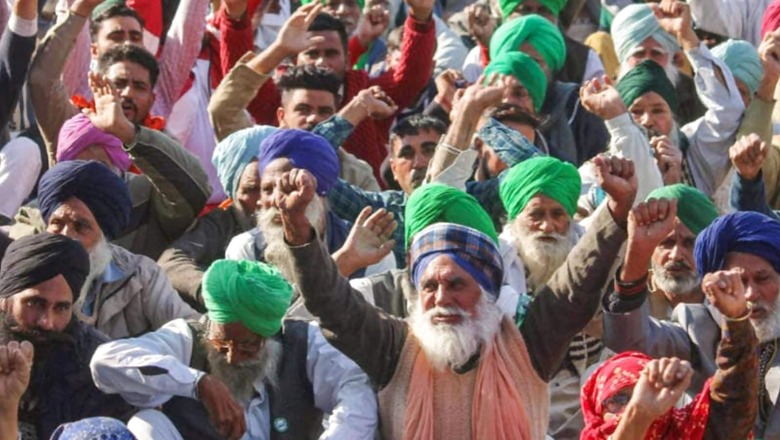
views
There are five implications of Prime Minister Narendra Modi taking a U-turn on India’s agricultural reforms. This is a U-turn the stakes on which India has never seen before. On November 19, 2021, Modi announced that the three farm laws—The Farmers’ Produce Trade and Commerce (Promotion and Facilitation) Act, 2020; The Essential Commodities (Amendment) Act, 2020; and The Farmers (Empowerment and Protection) Agreement on Price Assurance and Farm Services Act, 2020—that empower farmers will be repealed. As with all of Modi’s announcements, the U-turn is well-timed; by coming on Guru Nanak Jayanti, it imparts a religious flavour preceding the Punjab and Uttar Pradesh elections.
First, after the goods and services tax (GST), this was Modi’s deepest and most far-reaching reform. While the GST has changed the face of indirect taxes in India, has eased them and is smoothening them out (it still needs process reforms), the three farm laws would have transformed the functioning of agriculture in favour of those farmers who are not rich and flush with landholdings. What Prime Minister PV Narasimha Rao’s Statement on Industrial Policy 1991 did to manufacturing and services, Prime Minister Narendra Modi’s three farm laws would have done to agriculture. The saddest part of this U-turn is that India’s agriculture has now been condemned to be crushed under the feet of wealthy farmers, traders and middlemen for another full generation—no political party will dare touch these reforms for a quarter century. This is a big loss for India.
Second, those who supported the three farm laws have been deserted. Not just the Cabinet or Members of Parliament, the BJP ground worker will now be far more cynical and far less certain about what PM Modi announces. The BJP leadership will need to push more to get the cadre going. Right now, they have been thrown under the political bus. Several of them will rise, dust off this incident and restart. But this time, they know that the path could lead them to a political precipice. They will be guarded; they will exercise political caution. How they answer to their block-level constituents, remains to be seen.
Third, those who opposed the three farm laws have gotten a second wind, and they will demand more. It is not that those who led the agitation against these much-needed reforms—largely farm leaders with the Indian National Congress tagging along—will be satisfied. They will now turn the knife and draw more blood from taxpayers. Rich farmers, traders and middlemen will now demand greater returns, the hard-coding of minimum support price into law, with an inflation-indexed or higher return assured for crops that would be far cheaper to the nation when imported. Taxpayers will fund the lifestyles of these wealthy and inefficient landowners in Punjab and Uttar Pradesh.
Fourth, will this U-turn deliver political returns in the two states of Punjab and Uttar Pradesh? Unlikely. The electoral gains will be claimed by leaders who led the protests. They will feed off the dead farmers, turn them into martyrs and twist the deaths to their benefit. The BJP will may still win Uttar Pradesh, but the U-turn has given the opposition in the state a second wind, and, perhaps, planted second thoughts in the minds of voters about the party’s invincibility. Repeal or not, Punjab was never the BJP’s and if it gets a majority there, it will be surprising. That said, despite the unrepealed farm laws, the BJP won a second term in Assam earlier this year. So, there isn’t a direct relationship between laws and votes, economics and politics; this will be an electoral dynamic.
Fifth, those on the outskirts of agrarian reforms now have a toolkit with which to oppose any and every reform Modi undertakes. Like Bhishma who told Yudhishthira on battleground Kurukshetra how he could be defeated, Modi has given the Opposition the key to his vulnerability. He has told them, through this U-turn, that violence works and mobs work. He has assured them that he will overlook the interests of the silent majority as a price to buy peace on the streets and in the ballot box. He has ensured the victory of the violent and put those farmers who are not wealthy at the mercy of Agriculture Produce Market Committees that, according to the Standing Committee on Agriculture (2018-2019), has become a “hotbed of politics, corruption and monopoly of traders and middleman.”
What is puzzling is why Modi—who has been delivering reforms with a never-seen-before conviction ever since he took charge as Prime Minister in 2014 and has delivered hard policy decisions including, but not restricted to, demonetisation, the GST, the management of COVID-19 and the economics around it—has had to take such a disastrous U-turn on farm laws that would have empowered farmers and changed India’s agriculture. If he did not go back on the Citizenship Amendment Act (CAA) then why this U-turn on farm laws? Is this a precursor to going back on the CAA? Is he losing his touch? India will decide in 2024.
For those late to this farm party, the three farm laws are the biggest reforms in the sector since Independence. They were a part of Modi’s continuing signature as a reformer. They follow 20 years of discussion, debate and discourse, including in Parliament (See ‘An intellectual biography of India’s new farm laws,’ here).
Throughout the protests, interests of those farmers who are not wealthy and do not own vast tracts of land were missing. With the U-turn, Modi has condemned them to another quarter century of economic subjugation. They lose thrice over. One, they lose their flexibility to sell their produce at better prices outside mandis. Two, they return to the era of price controls, with high barriers to warehousing that protects perishables. And three, they lose the protections while engaging with institutions.
A sad day for farmers; this is going to be a sad quarter century for agriculture reforms.
This article was first published on ORF.
The author is Vice President at ORF. The views expressed in this article are those of the author and do not represent the stand of this publication.
Read all the Latest Opinions here
















Comments
0 comment